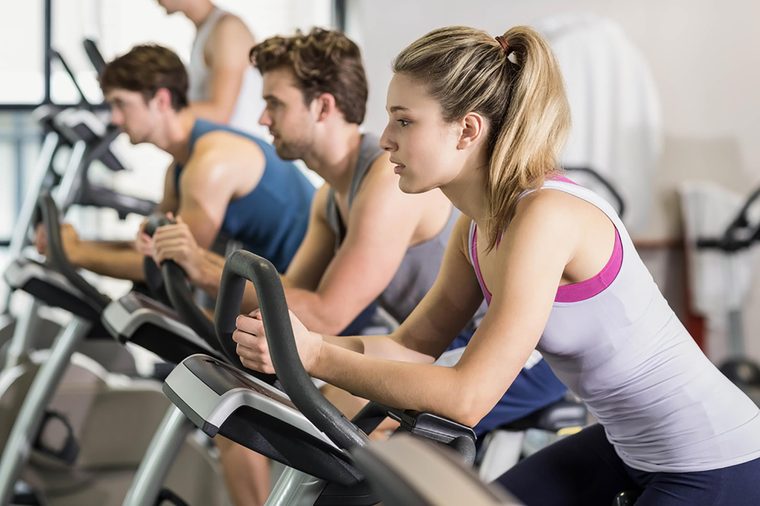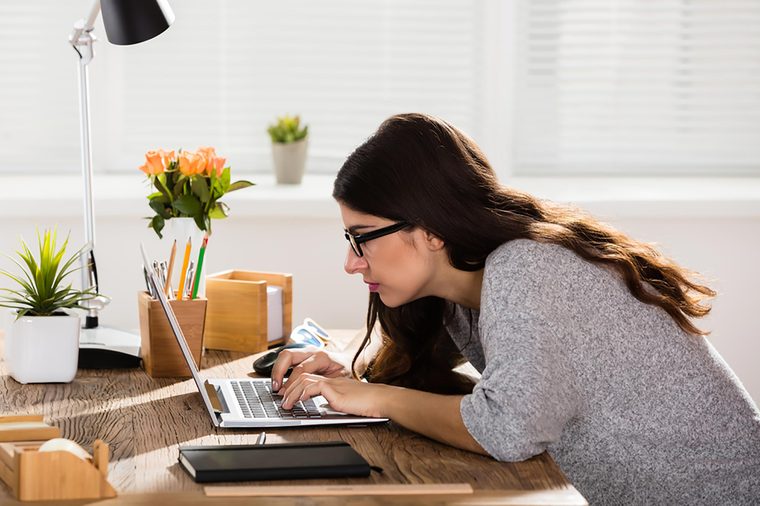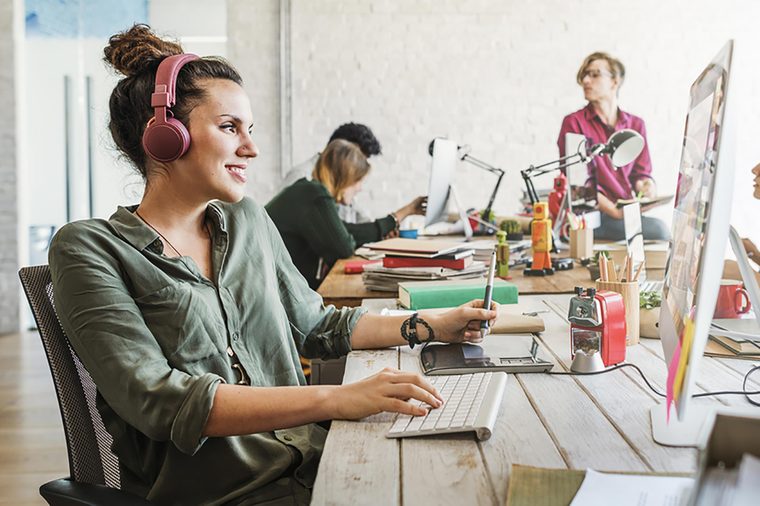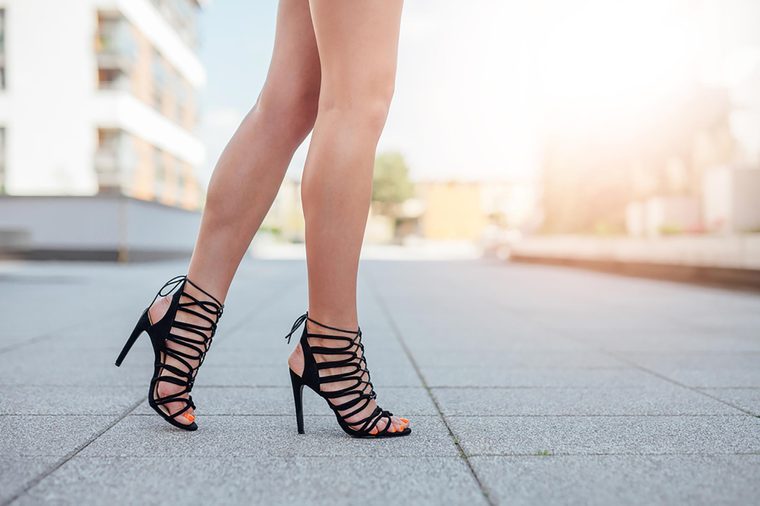Everyday habits that may hurt your spine
The way you stand, sit, and lie down can affect your spine—for better or for worse. It’s the most complex set of joints in the body—yet many people don’t give it much thought until their back starts to feel sore. Good spine health is necessary to prevent nerve damage, osteoarthritis, and musculoskeletal problems.
Take better care of your back and avoid these everyday habits that can potentially hurt your spine.

Your exercise routine—or lack thereof
Exercise has multiple health benefits beyond weight loss, but the type of exercise that you are doing—or in some cases, not doing—may leave your bones brittle. First the good news: “Weight-bearing exercise helps increase bone density in the spine and elsewhere, and exercises that target the core can help strengthen the muscles surrounding the back and spine,” says David Pisetsky, MD, chief of rheumatology at Duke University Medical Center in Durham, North Carolina. Aim for 30 to 40 minutes three to four times each week including weight-bearing and resistance exercises, the International Osteoporosis Foundation suggests.
Now the bad news: Some popular exercises, including cycling and spin classes, may cause or worsen back and neck problems because certain bikes may force the rider to lean forward and down for long periods of time. Not exercising at all is another back-breaker over time, as it simply allows bone density to naturally decline with age.

Your smoking habit
First, if you smoke, here are 23 ways to stop smoking and start on your path toward a healthier, smoke-free life. Because yes—in addition to all the other health ills associated with smoking—this habit can also damage your spine, says Nathaniel Tindel, MD, an orthopedic spine surgeon at Lenox Hill Hospital in New York City and the author of I’ve Got Your Back: The Truth About Spine Surgery, Straight From a Surgeon. “Most people don’t realize that smoking affects bone and can cause premature disc degeneration,” he says. Smoking inhibits circulation to the disc, dehydrating it and making it difficult for these discs to absorb the nutrients they need to stay healthy. The backbone (vertebrae) is lined with discs or cushions that absorb stress and shock during movement. Degenerative disc disease occurs when these discs dry out, thin, or crack. Smoking increases the risk of osteoporosis as well as degenerative disc disease, too.

Your dairy dilemma
Calcium is important for bone health, and dairy products are an important source of calcium, but if you are lactose intolerant and gave up milk, cheese, and yogurt due to the bloating, diarrhea, and gas you experience after consuming them, your bones may suffer. “If your bones get soft, you may sustain multiple painful pressure factors in your spine,” Dr. Tindel says. Other good sources of dairy include leafy green vegetable, fish with soft bones such as canned sardines and salmon and calcium-enriched foods. Aim for 1,000 mg a day if you are 50 or younger, and step it up to 1200 mg if you are older than 50. Check to see if you’re getting enough calcium. If you’re not, talk to your doctor about supplements.

Your poor posture
Ever notice how those regular yoga practitioners stand so straight? Turns out, yoga for back pain may be just as effective as physical therapy—and it’s excellent for improving your posture. “As we age, gravity works against us and can cause the spine to compress, and poor posture can exacerbate this problem and cause the spine to compress even further, oftentimes rounding the body, troubling the disks and causing pain,” explains New York City yoga instructor Lauren Harris.
Fight this by “standing upright with your chest lifted and your shoulders down away from ears, unrounded,” she says. Spine lengthening stretches in a yoga practice can be particularly effective in working against this compression as can gentle back bending and twisting, she says. “In addition, core strengthening exercises can help to provide muscular support to the spine so that we are able to maintain healthy posture both on and off of our mats,” she says.
Look for a local yoga studio that matches your experience—beginner, intermediate or advanced. DVDs and online tutorials may also help you get started.

Your obsessive use of sunscreen
Sunscreen is still the best way to reduce the risk of skin cancer and prevent premature lines and wrinkles. But the only way our body makes vitamin D is when it’s exposed to sunlight. You can’t get all that you need from food, yet your body requires vitamin D to absorb calcium.
“Don’t get sunburnt. Ever,” Dr. Pisetsky warns. But allowing yourself 15 minutes of sunlight to help boost D production in the morning before slathering on the screen is fine. Or you could get your own grow light: A 2017 study in Scientific Reports suggests that light from digital ultraviolet (UV) light may be more efficient than sunlight at producing vitamin D in skin. In fact, skin samples exposed to RayVio’s UV LED for just 52 minutes produced more than twice as much vitamin D as samples exposed to 33 minutes of sunlight. It’s not a bad idea to ask for a blood test to see if you are deficient in vitamin D and act accordingly.

Your smartphone addiction
Has your smartphone habit become something more? This can result in tech neck, explains Greg Shure, chiropractor and founder of Madison Square Wellness in New York City. “When you are leaning down to stare at your screen, the forward-head posture causes the upper spine into an over-flexed position, which can compress the spinal discs over time,” he says. Plus, here’s how your cell phone affects your mind and body.

Your desk job
“Sitting at a desk with poor ergonomics causes us to slouch over which adds strain to the lower back, causing pain,” Dr. Shure says. His advice? Take frequent walking breaks and consider talking with an occupational therapist about your workspace accommodations and/or connecting with a chiropractor to learn the right way to exercise your neck. Try these tweaks to your daily routine and desk set-up to get pain-free, on—and off—the clock.

Your coffee habit
The caffeine in coffee and soda may decrease calcium absorption, although studies are mixed on what type of effect this may have on bone density and fracture risk. “Make sure you are getting enough calcium whether through diet or supplements,” Dr. Tindel says. Don’t miss these other things you need to know about your bone health right now.

Your medications
Certain medications may weaken your bones—primarily steroids, Dr. Pisetsky says. “The higher the dose, the bigger the impact on our bones and spine.” Here are some steps you can take to decrease your risk of the brittle bone disease osteoporosis. Some drugs can counteract ‘steroid-induced osteoporosis’—including bisphosphonates, he says. Discuss your medications with your doctor to see if they are affecting your bone density, and ask if there are any steps you can take to reverse these effects.

Your inability to say how you really feel
“Our emotional systems contribute strongly to the way we channel pain into muscle groups and bodily systems including our backs and spines,” explains Nicole J Sachs, LCSW, a licensed clinical social worker and author of The Meaning of Truth: Embrace Your Truth, Create Your Life, in Rehoboth Beach, Delaware. “If we don’t let ourselves feel the natural anger, sadness and fear in life, we are likely to experience physical pain and conditions such as back pain,” she says.
“The best way to allow these feeling to safely rise is through journaling, in a fashion I call JournalSpeak,” a method of journaling where true feelings are allowed to be heard and felt (only by you, no need to confront anyone or change your life). The simple act of writing things down can help you clarify your feelings and render them less emotionally and physically stressful.

The way you lift your kids and pets
How you lift and carry your kids and pets may put undue stress on your back and spine, Dr. Tindel says. There’s a right way to lift heavy objects and a wrong way, he says. Here’s the right way: Your feet should be shoulder-width apart, and when you squat down, bend at the hips and knees only, he says. “Hold the load as close to your body as possible. (There may be other secret reasons for your back pain too.)

Your backpack style
Backpacks get a bad rap when it comes to causing back pain, but it’s not the backpack that’s to blame. Instead, it is how many people wear backpacks and all of the unnecessary stuff they fill them with, Dr. Tindel says. “Always wear it on both shoulders, and make sure that it comes with a waistband that you fasten which will take the weight off of your back. Make sure everything in your backpack is 100 percent necessary. “Some kids carry around lots of extra books, devices, and supplies that they don’t really need which just increases the load,” he says.

Your affinity for statement necklaces
Clunky statement necklaces can force the neck and spine into an over-flexed position, resulting in poor posture and neck, spine or shoulder pain, Shure explains. If you love the look, try wearing these necklaces for short periods of time only.

Your way-too-heavy handbag
Heavy handbags can damage the spine and cause back pain. Pay attention to the bag you carry around and regularly check for unnecessary items. If your handbag is getting too hefty, it’s time to lighten your load.

Your high heels
You don’t have to be fashion first to love the look of high heels, but these sexy, showy shoes can put the foot at an angle that promotes tension in your spine, resulting in low back, neck and shoulder pain. Podiatrists offer these tips to comfortably wear high heels.

